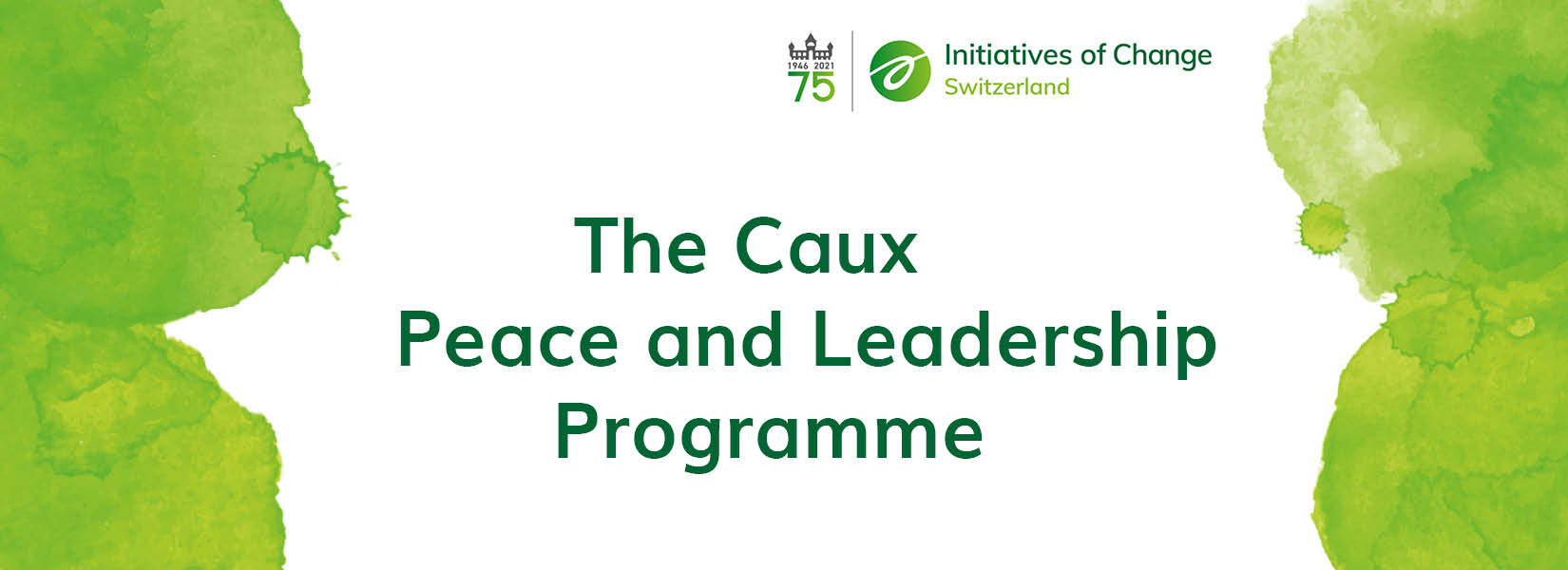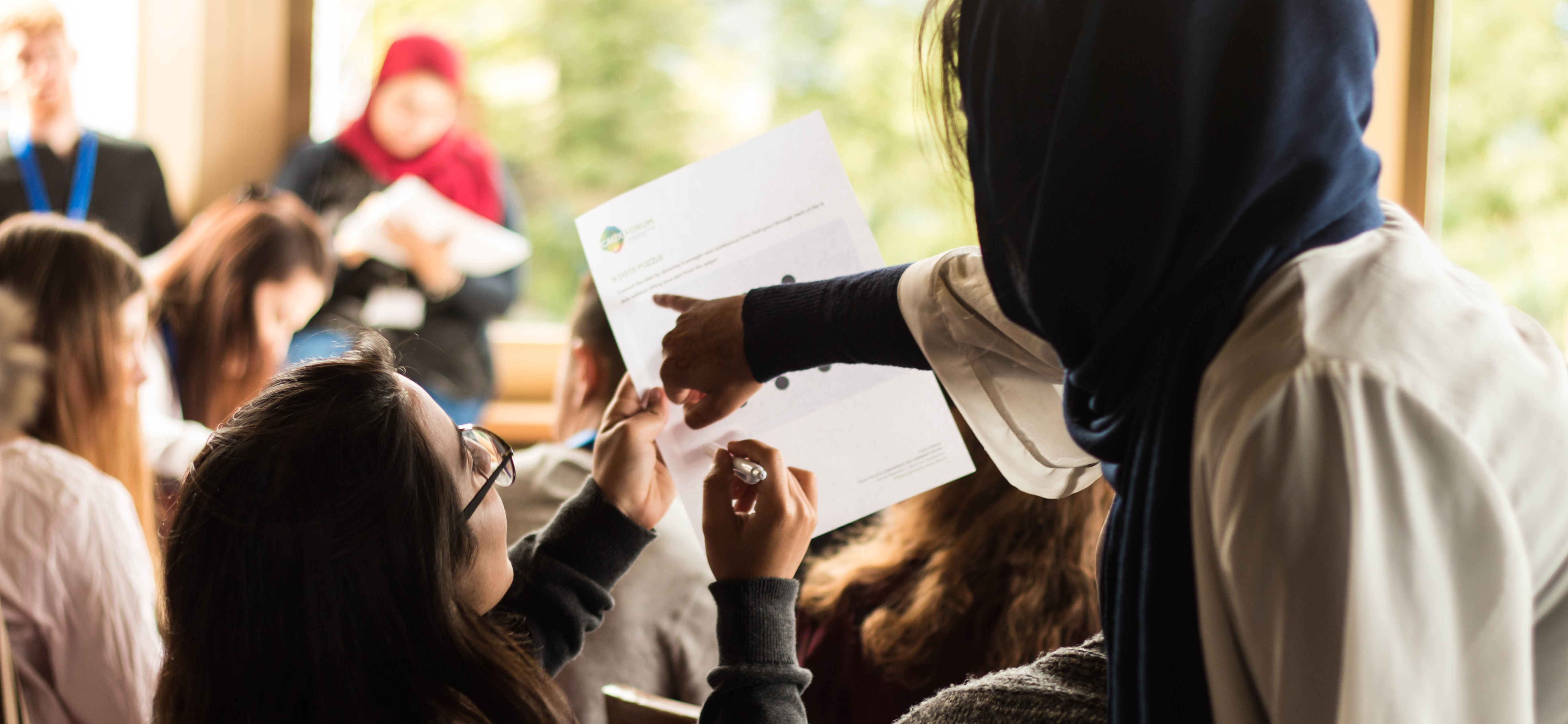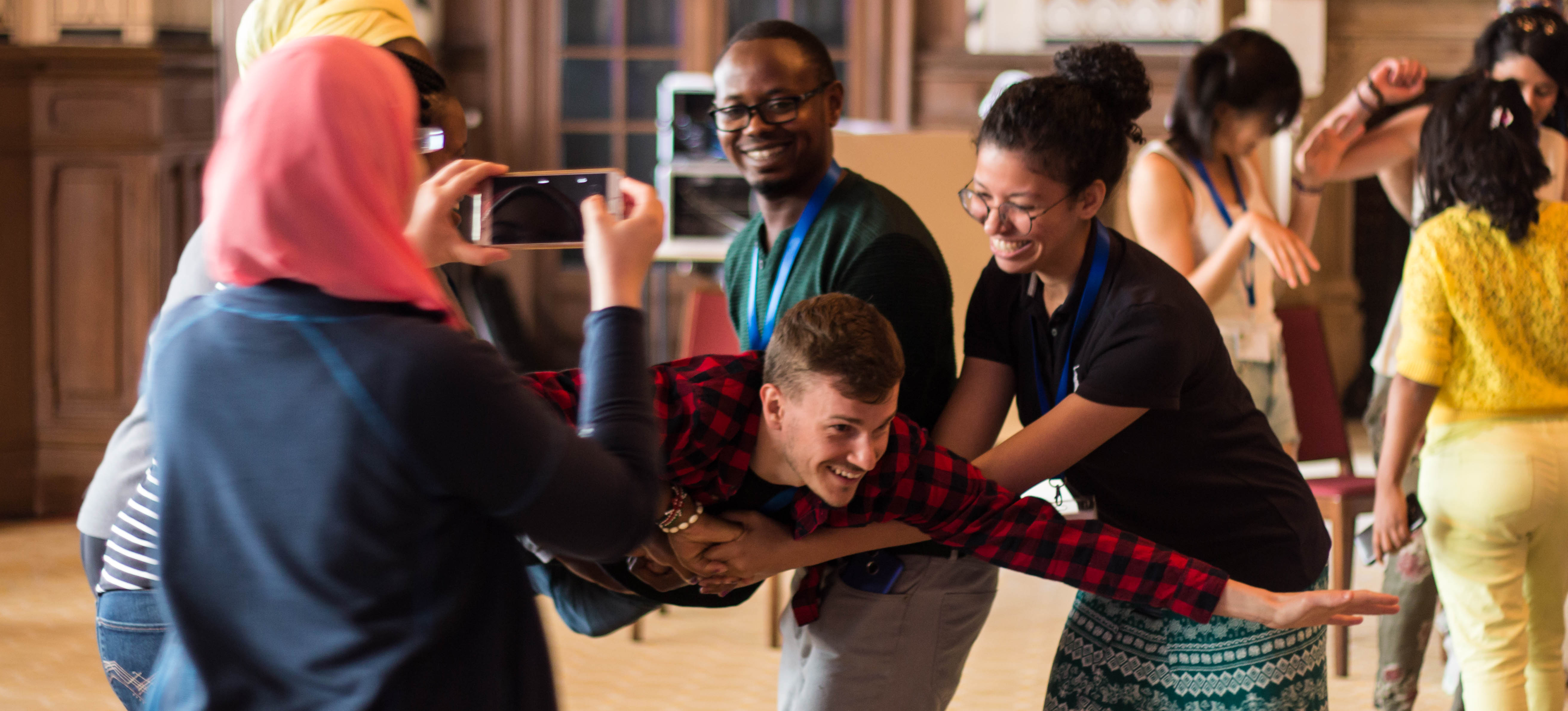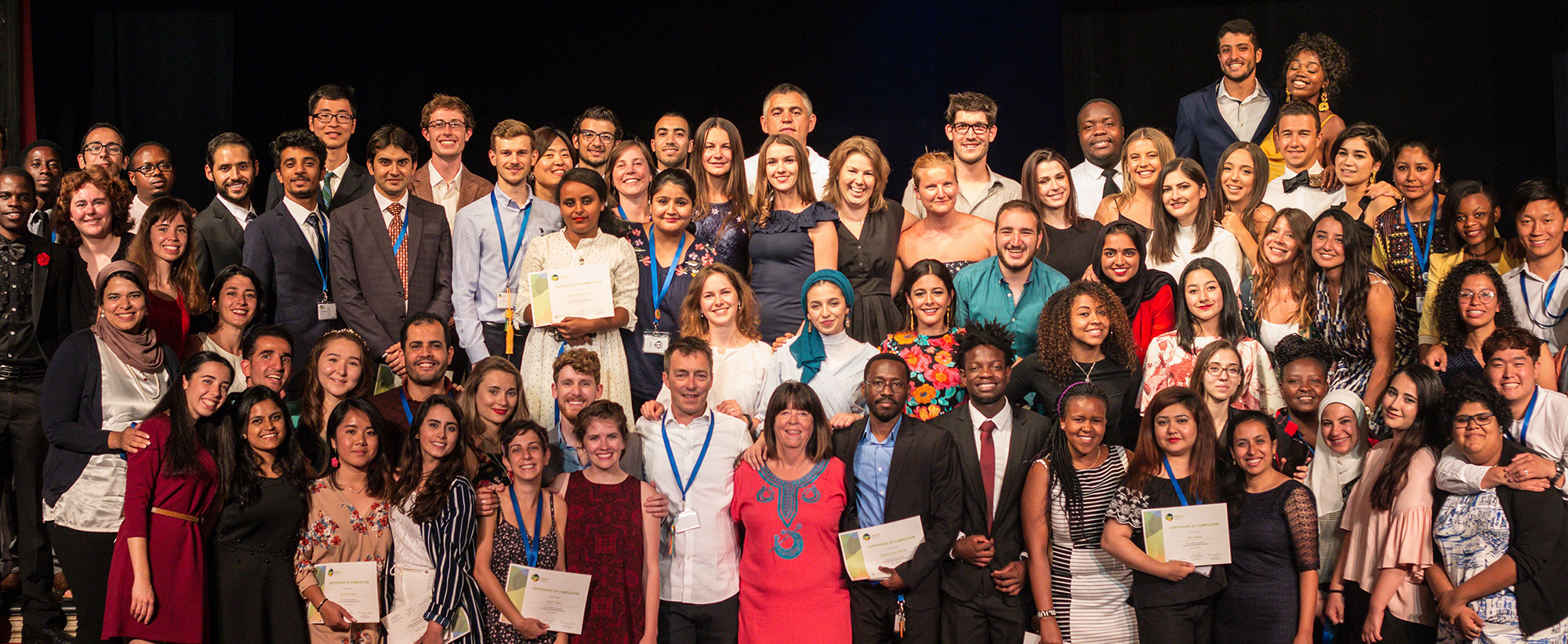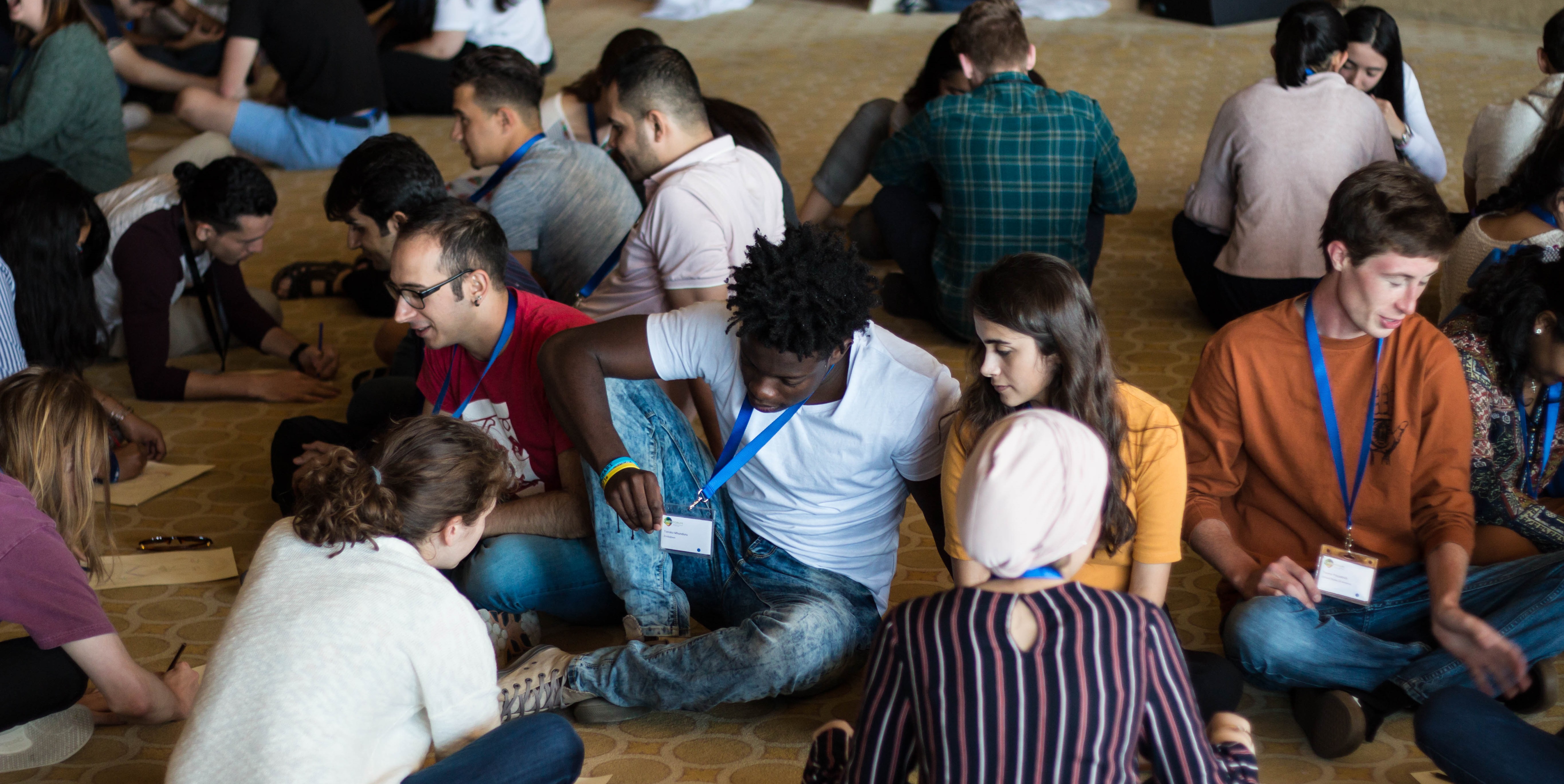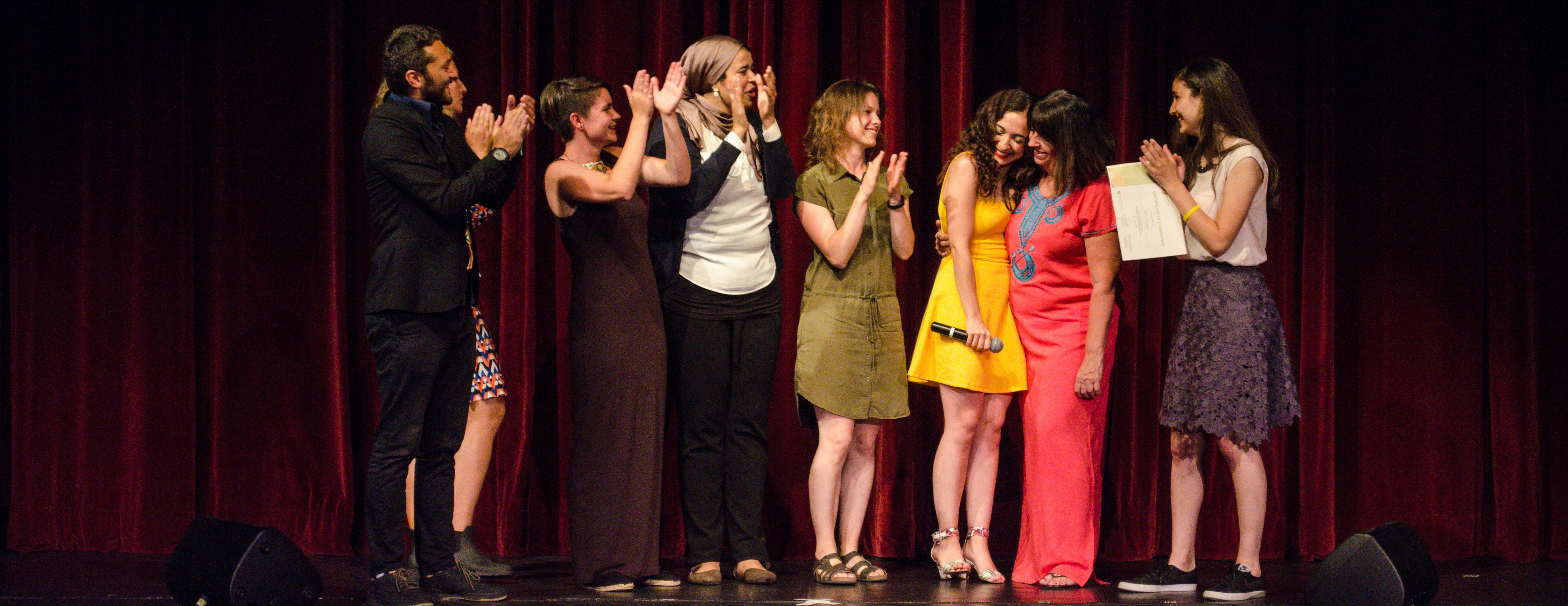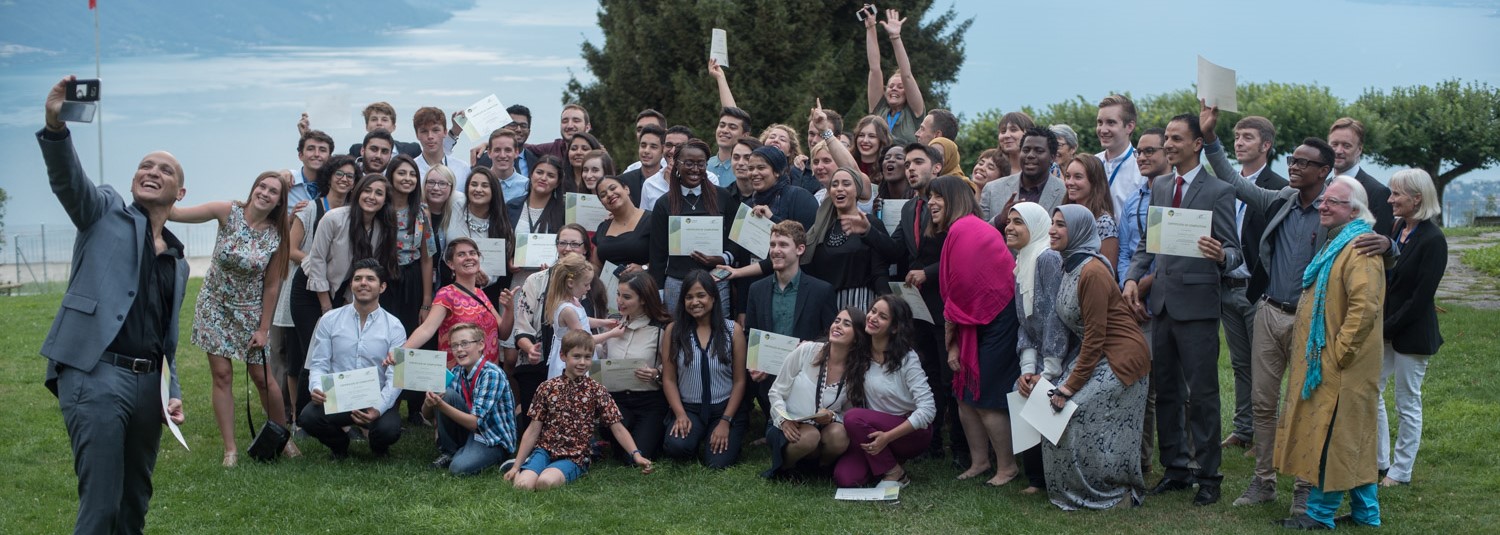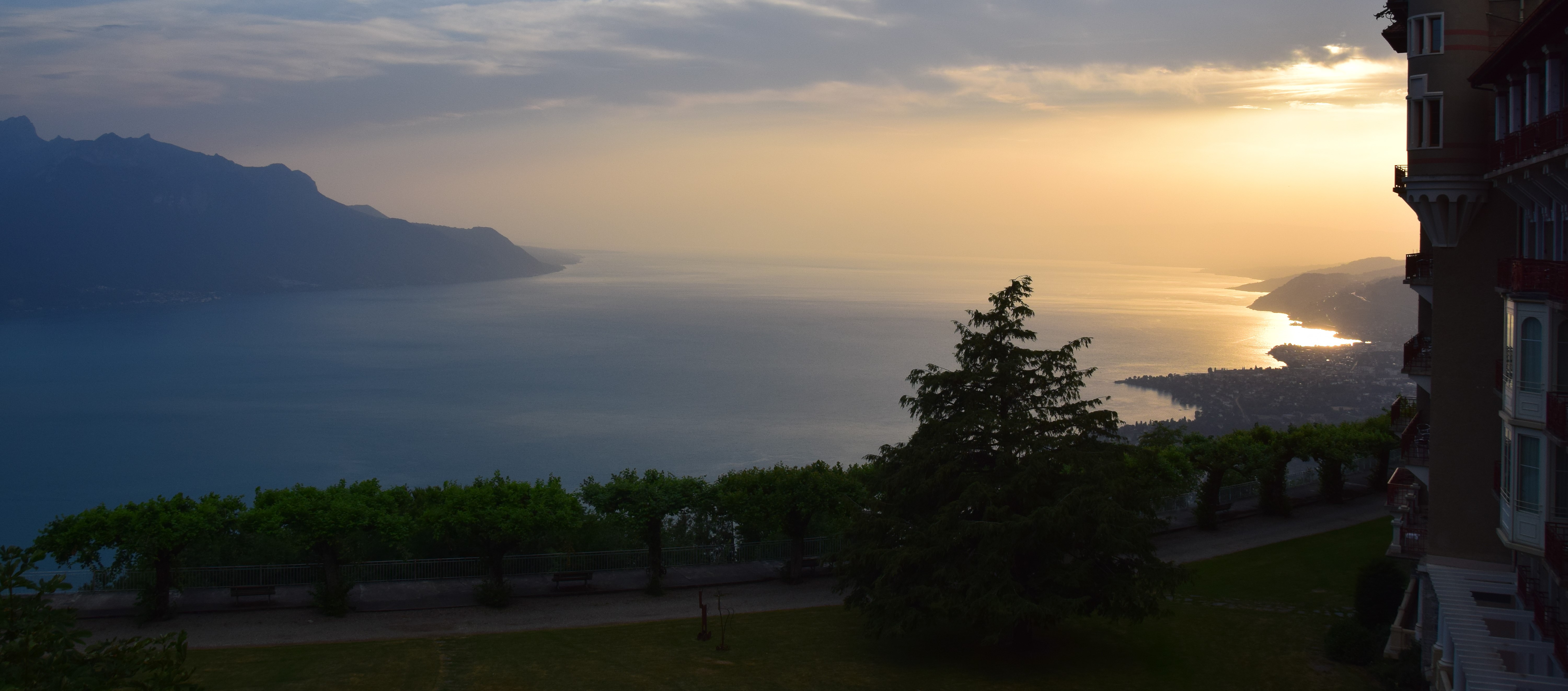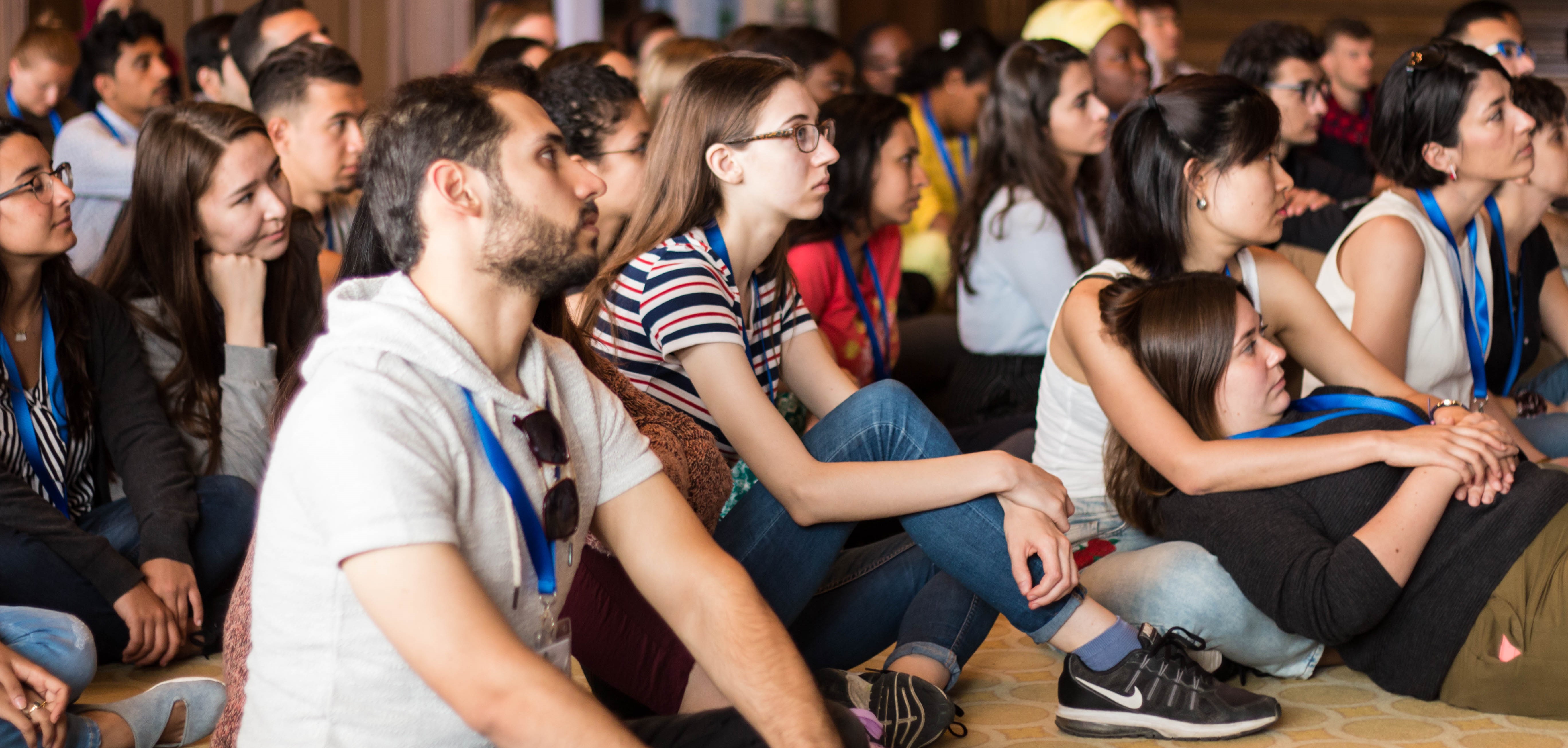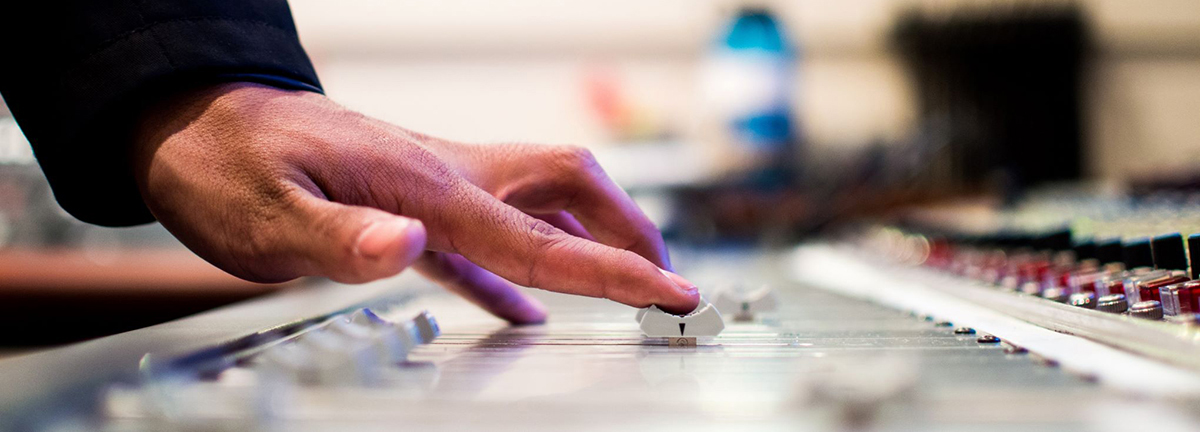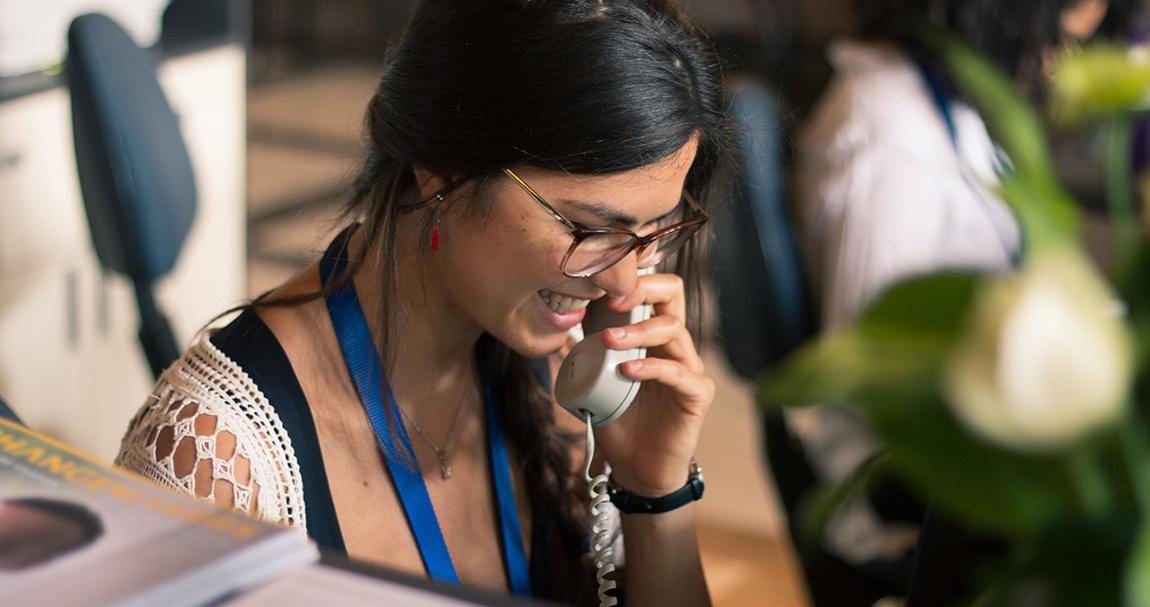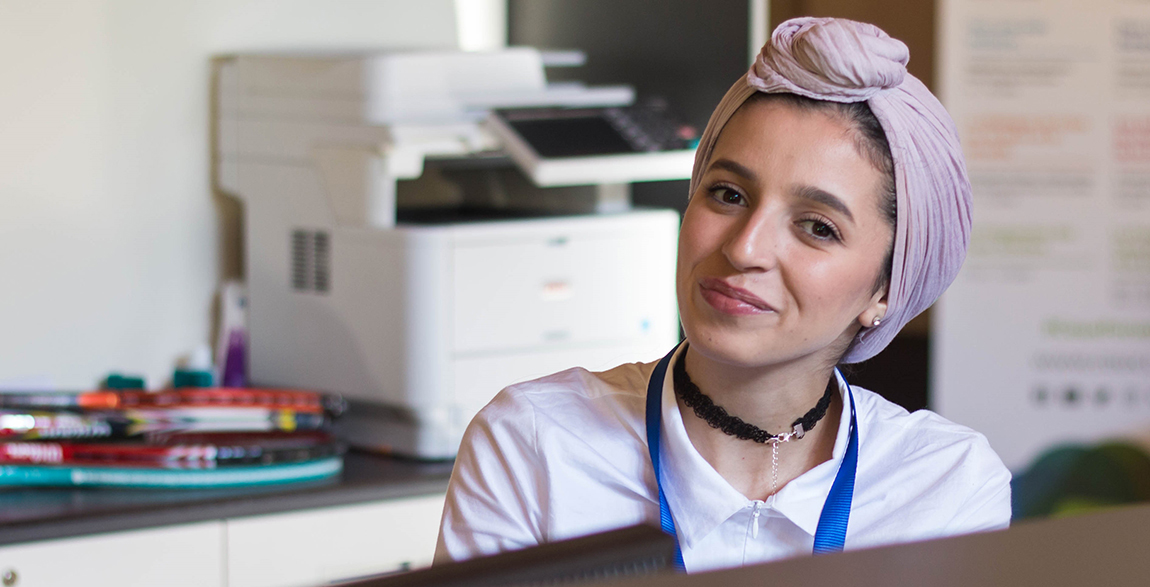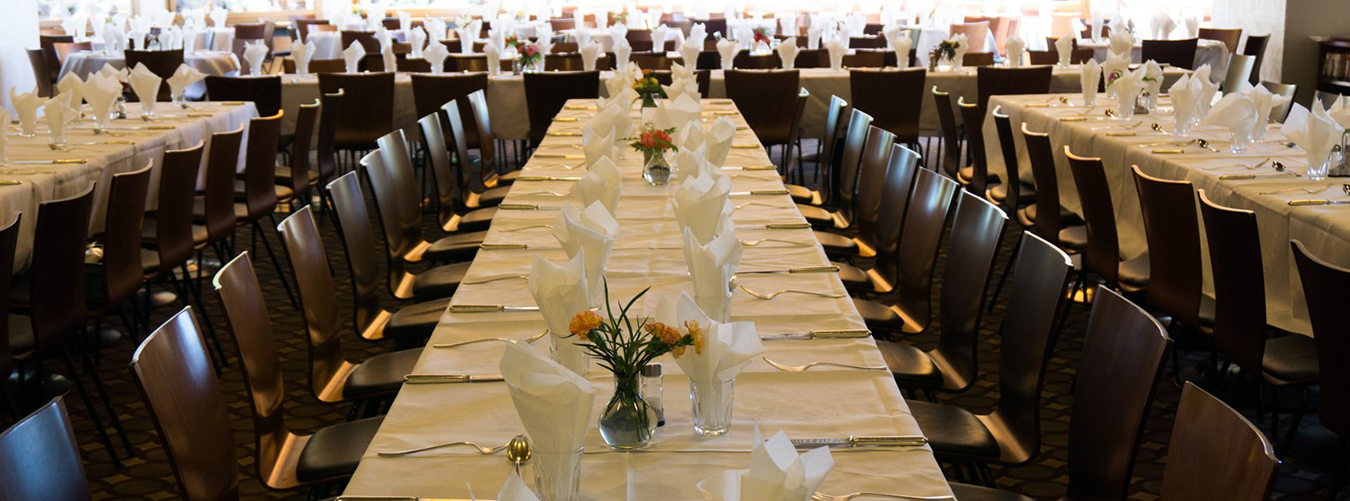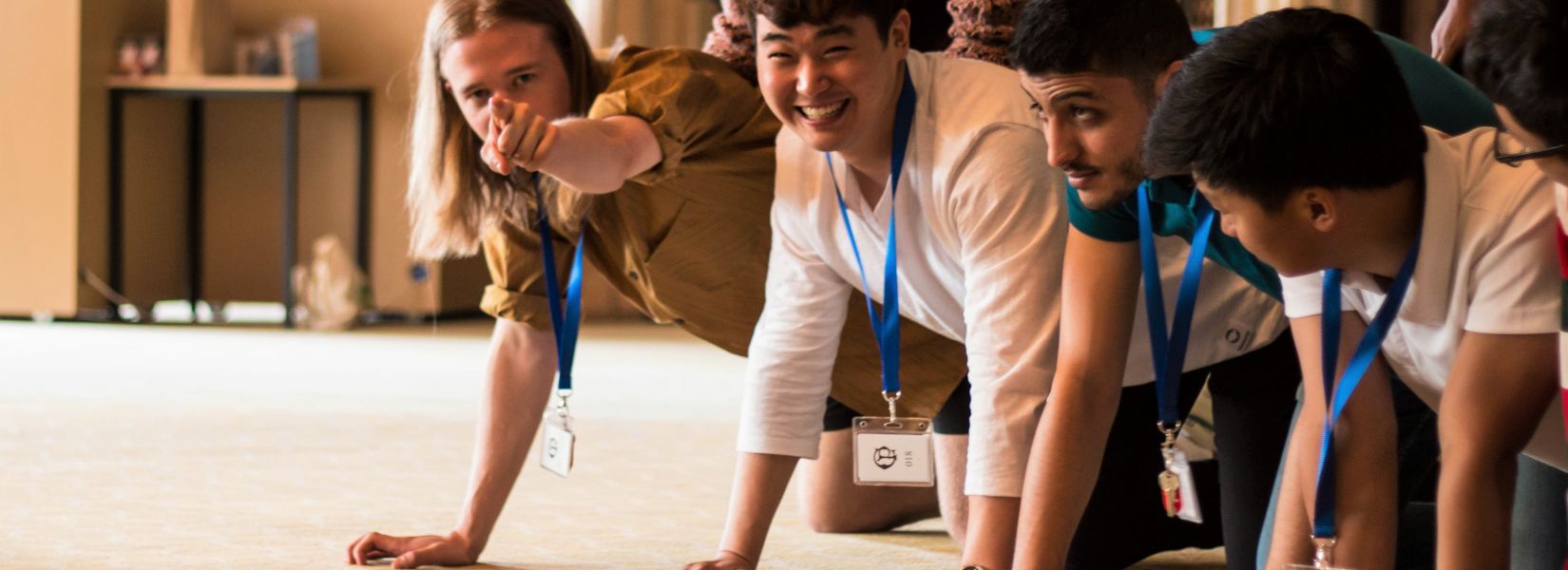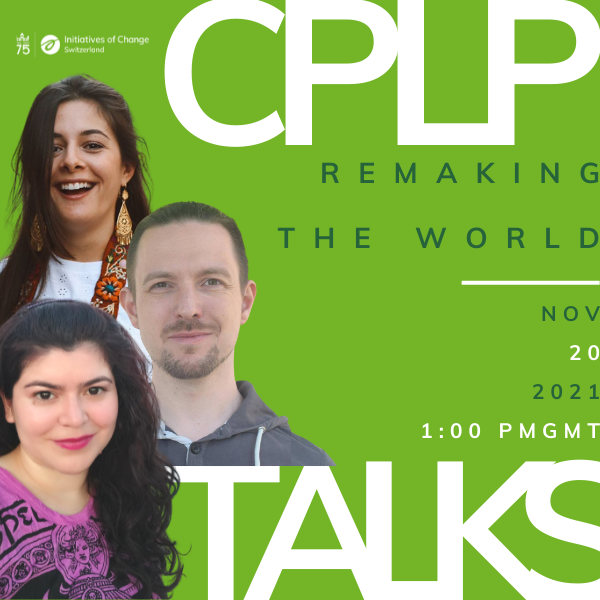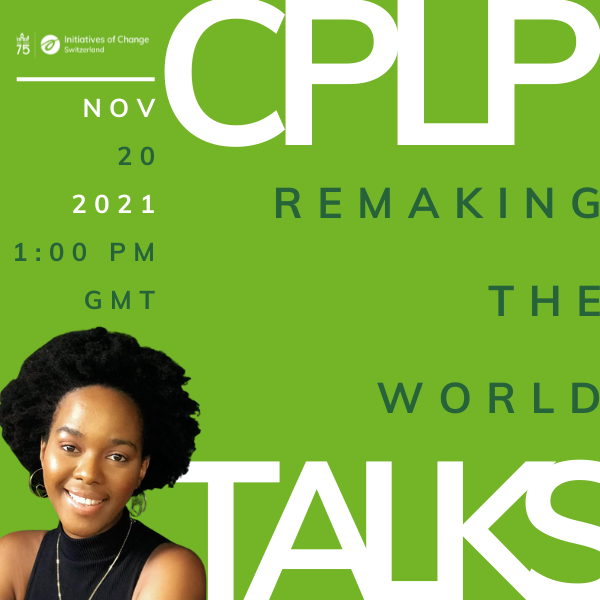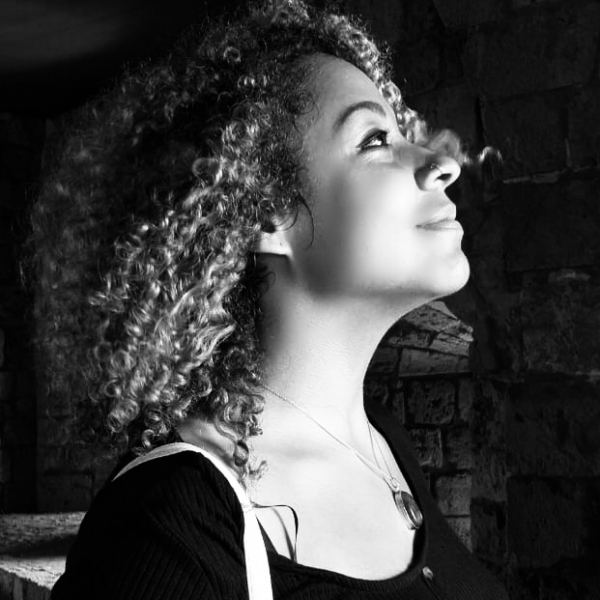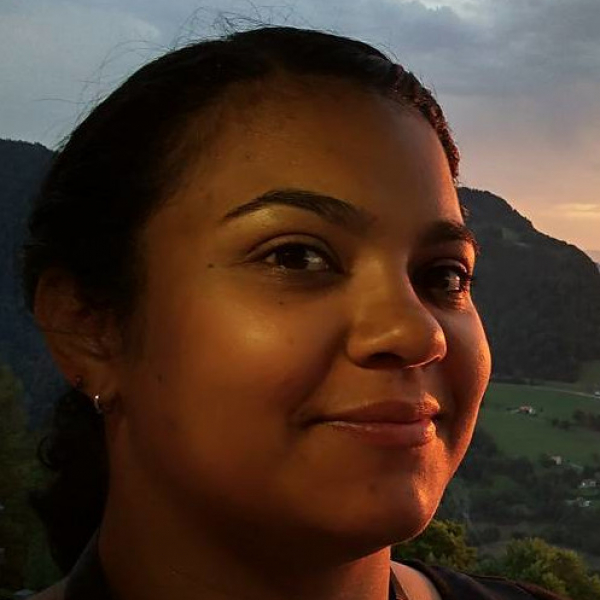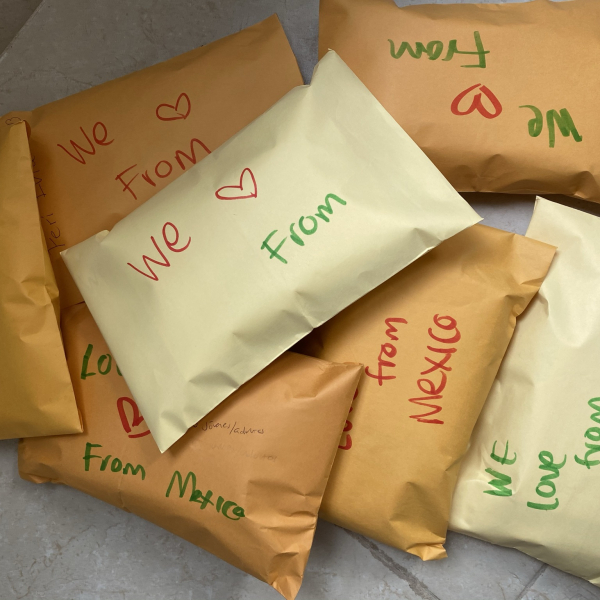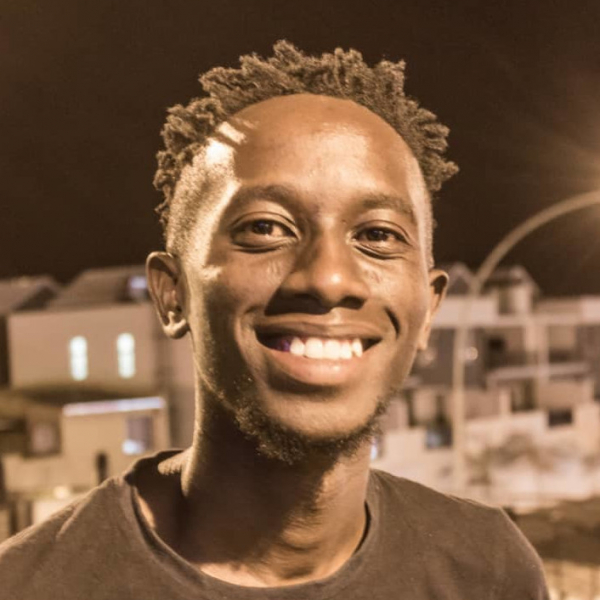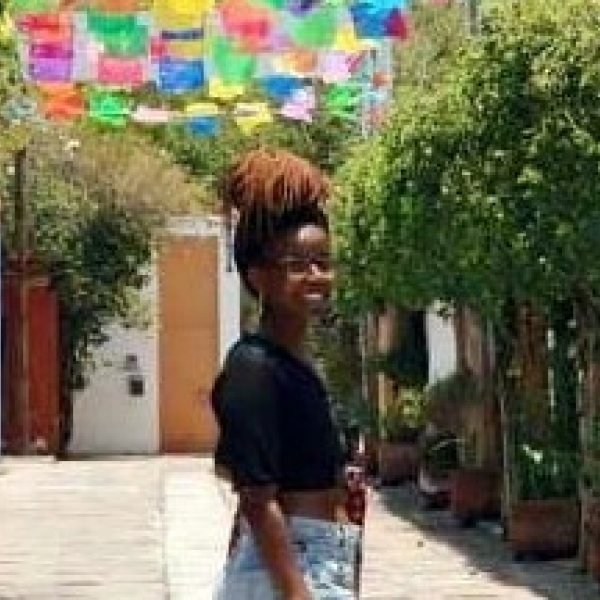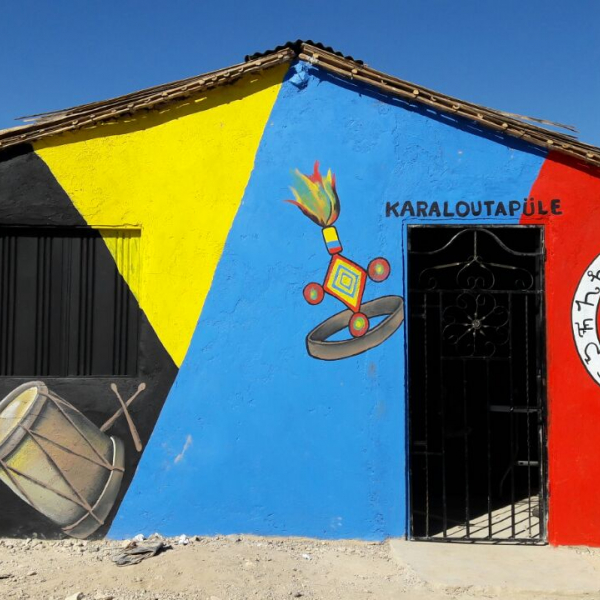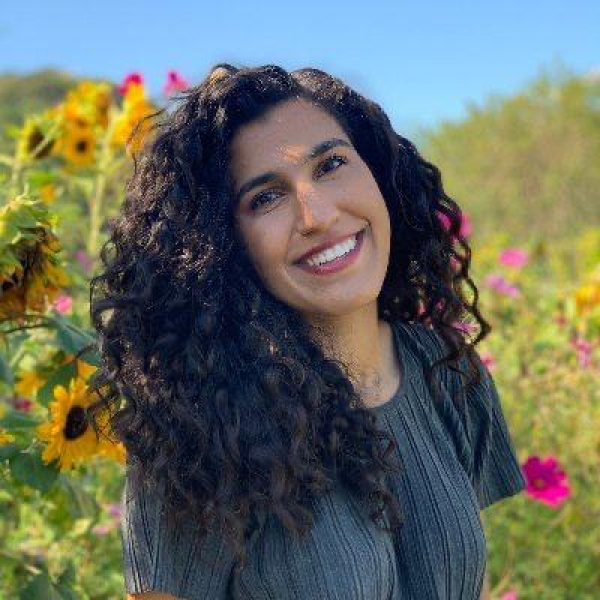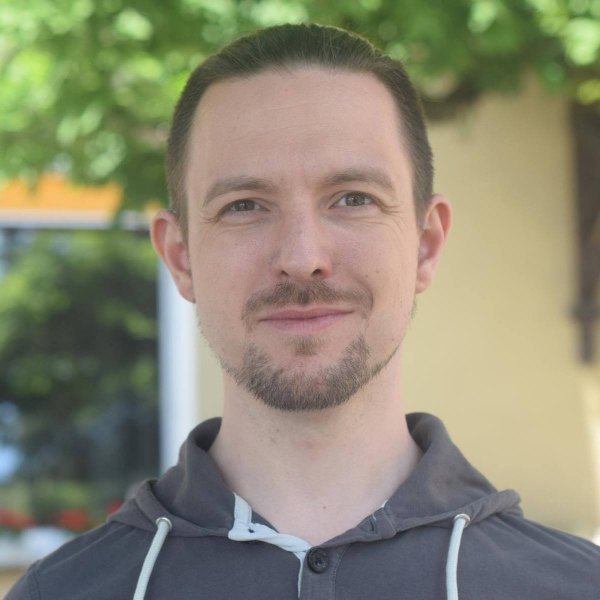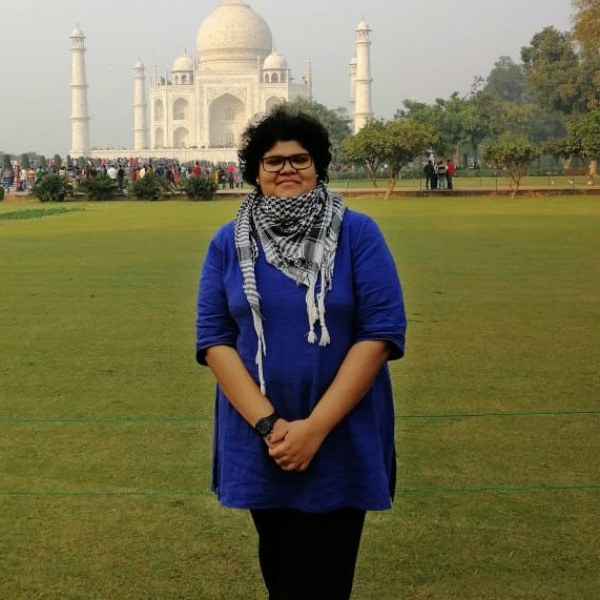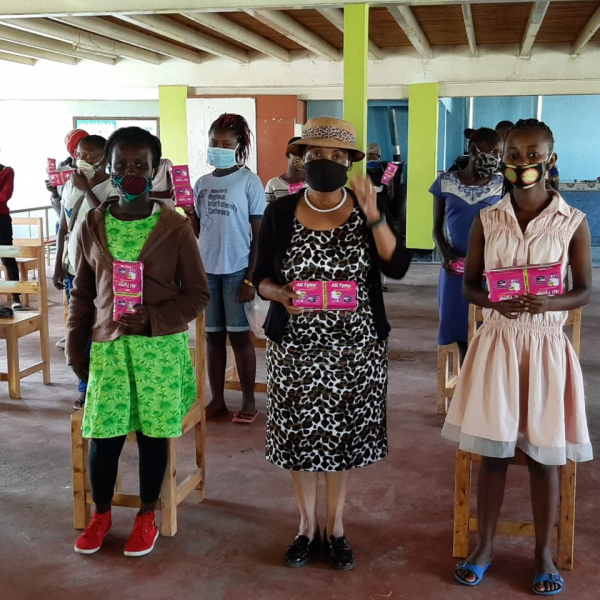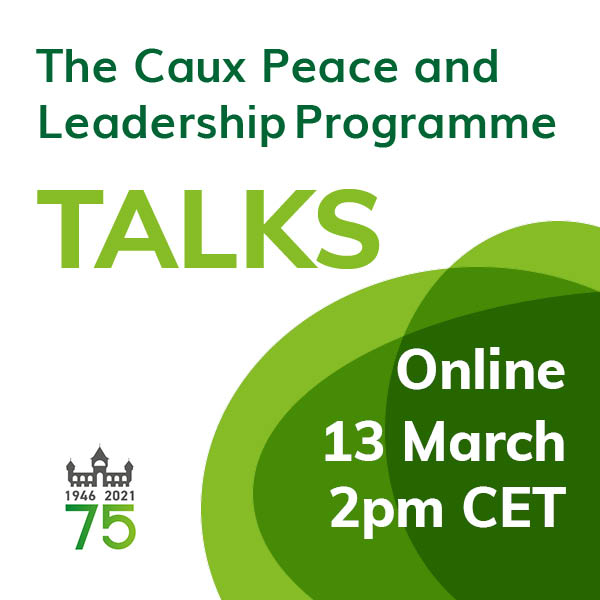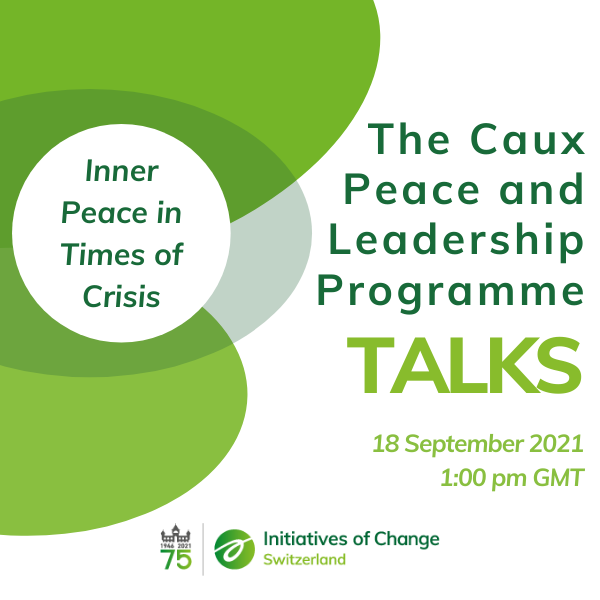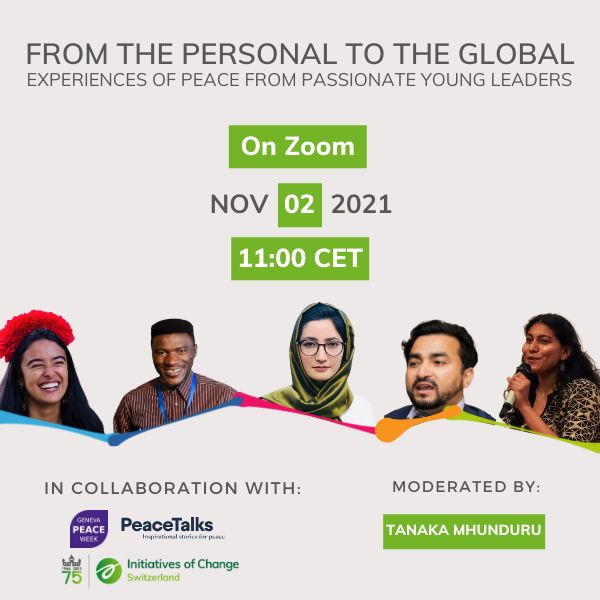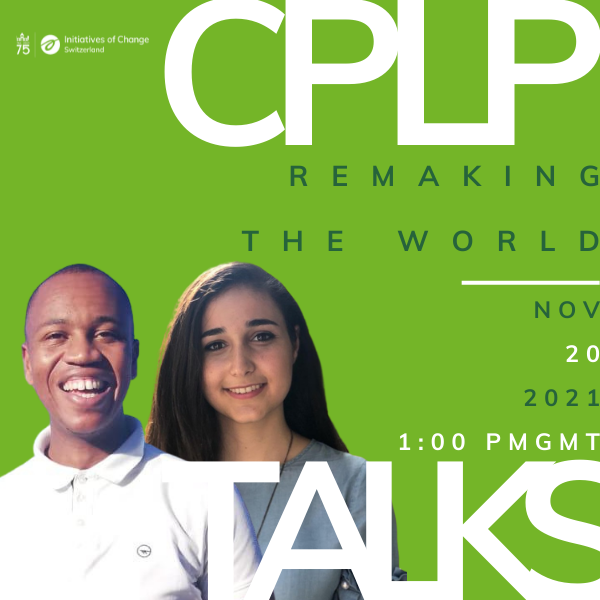Due to the uncertain development of the COVID pandemic the Caux Peace and Leadership Programme will not take place in 2021. Applications for 2022 will be open in December.
In the meantime we have some exciting offers which might interest you. Everyone is welcome to join the Caux Peace and Leadership Programme online conversations, the CPLP Talks, and you can read the different articles to discover stories and initiatives by our alumni (see below our related stories).
For more information, contact us here.
What is the Caux Peace and Leadership Programme?
In exploring the concepts of peace through dialogue, we often find our own peace. Leadership is demonstrated through personal practice and learned through working as part of a diverse team to serve the needs of the Forum and its participants. Service to each other mirrors our desire to serve the world.
At the heart of the Caux Peace and Leadership Programme (CPLP) is listening. We listen to our own inner voice through personal reflection, we listen to the stories of our fellow participants and we listen to the speakers and contributors to the international events in the Caux Forum which run throughout the programme.
CPLP is a one month programme where learning is achieved through experience, interaction and service, rather than academic study. Moreover, it is a unique opportunity to look behind the scenes of a Conference and Seminar Centre by contributing actively to welcoming and serving each other and those who attend the Caux Forum. There are two levels: 'Discoverer' and 'Practitioner' which run side by side.
General Information
You can join the programme either for the first time as a ‘Discoverer’ or as a ‘Practitioner’ to build on past experiences with IofC and/or the CPLP. In both cases, you will be asked to choose one of the Caux Conference and Seminar Centre’s Hospitality departments where you will complete the practical part of the programme.
Year 1: Discoverer
This group is open to those who want to develop specific skills and to develop their inner selves. You will receive expert tuition on facilitation for dialogue, the theory and practice of storytelling, and take part in an exploration of core values across a diverse group of people from different cultures, beliefs and viewpoints.
As part of the group attending the programme for the first time, you will primarily focus on:
- Looking at yourselves: personal leadership, our values, our assumptions, who are we? who am I? and tools to find inner peace
- Looking at the wider CPLP group: learning more about each other, other cultures and exploring storytelling as a skill to break down stereotypes
- Exploring the concept of dialogue: learning about facilitation and how to have difficult conversations, how to find what rather than who is right
- Concepts of leadership: exploring and improving leadership skills through non-judgemental interactions
- Inspiring, equipping and connecting changemakers as you prepare to return to your communities
- Engaging in active discussions on topical global issues
- Exploring Initiatives of Change’s (IofC) values and approach
There will also be time to attend, find inspiration in and network at the Caux Forum conferences.
Year 2: Practitioner
The CPLP Year 2 group builds upon and runs in parallel to the Year 1 of the CPLP. It is aimed at past Year 1 participants of the programme who have taken steps of change in their own lives and who have held or hold some kind of leadership role within their community, CPLP planning, project or IofC environment.
Trainings will be conducted exclusively for CPLP Practitioners, while the service component, workshops and evening programs are combined for both Practitioners and Discoverers.
The Practitioner stream (Year 2) of the CPLP includes:
- a service role within a department of the Caux Conference and Seminar Centre
- act as a ‘Buddy’ for a Discoverer in year 1 and actively walk alongside that person through the CPLP and beyond
- access to a ‘Mentor’
- opportunities to host quiet time sessions for the CPLP and the wider Caux team
- responsibility for workshops and evening programmes, as agreed with the Faculty team.
- A chance to act as a Facilitator in dialogues and discussions after receiving the appropriate training
As a returning participant, you will mainly focus on:
- Deepening your understanding of IofC values and applying them in your daily lives.
- Deeper exploration of Dialogue Facilitation as a tool for peace building, exploring and developing our internal and external listening skills and, time permitting, working with conference teams within the Caux Forum as Community Group Facilitators. More in-depth learning about presentation skills and storytelling, including using these freshly developed skills to train others.
- More time spent within the Caux Forum and delving deeper into the conference topics in dialogues.
- Dialogues on global issues facilitated by members of the Programme
- Taking on leadership roles within the Caux Forum and developing self-assessment skills.
It is not a given that attending CPLP Year 1 will lead to acceptance into the Practitioner group.
Each week during the CPLP will be split in two:
- formal time (approx. 22 hours per week) when you will attend learning sessions and skill-building workshops, take time for inner reflection, be part of the Caux Forum and attend dialogue sessions related to your learning
- the practical service element (approx. 22 hours per week) where you will apply your learning in one of the Caux Conference and Seminar Centre’s Hospitality departments. During this time you will be assessed on your leadership skills.
- You will be given time off each week for rest and relaxation. There will be hikes and opportunities for taking part in sports.
In applying for the CPLP you are committing to attending all the constituent parts of the programme.
In order to comply with Swiss law, for the service element of the programme you must have a Swiss work permit. The HR Department will apply for this on your behalf.
You are welcome to apply for either stage of the programme if:
- You are aged 18 to 45 years old
- You are available for the full session (30 days) in Caux
- You commit to try and live IofC values and abide by the House rules
- You have adequate travel and health insurance for Switzerland
- You apply with a valid passport
- You have excellent written and oral English communication skills
You are welcome to apply for Year 2, Practitioner, if you:
- You have attended Year 1 (Discoverer) of the CPLP. Please note that not all Discoverers will be automatically accepted to be on Year 2 as the number of spots are limited.
- You are aged 18 to 45 years old
- You are available for the full session (30 days) in Caux
- You have adequate travel and health insurance for Switzerland
- You apply with a valid passport
- You have excellent written and oral English communication skills
Your application will be given priority if:
You have a recommendation letter from someone who is connected to the CPLP, an IofC initiative or national team
OR
If you are already part of an IofC team or have attended an IofC Programme anywhere in the world (including CPLP)
In some departments French/German is an asset.
- Training to look deeper into self and the methodology of IofC; on how to train others and to facilitate dialogue, followed by practical opportunities to apply this learning within the Programme and the Forum events.
- The chance to host our visitors both external and internal, acting as an ambassador for the CPLP and the Caux Forum.
- To meet and dialogue with a group of changemakers from around the world to challenge stereotypes and to discover more about yourself, your perceptions and your view of the world.
- To explore both your own values and those of Initiatives of Change, together with its practices, and how to apply them in today’s world.
- To participate in some parts of the Caux Forum
- To learn about dialogue and dialogue facilitation and to practice these skills within the Caux environment.
- To be given time and space for personal reflection including quiet time.
- To have the opportunity to develop your own project or one as part of an international group.
- Time and space to explore both your future and the future of the CPLP as it moves out into the world.
- To be willing and ready to actively participate and fully attend the Programme.
- To be committed to the spirit of service and the concept that personal change leads to global change.
- To be ready and open to the reflective practices which are part of the Initiatives of Change methodology i.e. Quiet Time.
- To agree to keep to the rules of Caux and to respect others.
- To be ready to take part in Storytelling and to give more than you expect to receive.
- To demonstrate excellent written and oral English communication skills.
- To arrive and leave the Programme on the dates agreed with the HR Department and to answer correspondence, including submitting all the required paperwork, within given deadlines.
- To be ready to share your allocated bedroom with another CPLP participant of the same gender. It’s a great way of discovering more about another country and culture and making lifelong friends.
- You should read about the values and principles of Initiatives of Change, the Caux Forum and more information about the CPLP and then decide if this is programme echoes your own principles and values.
- Fill in the application form once applications are open.
The Caux Peace and Leadership Programme takes place in Caux, a little village in the Swiss mountains above Montreux, overlooking Lake Geneva.
All programme participants will be provided with room and board at the Caux Palace.
Please be aware that full commitment and attendance of all training sessions, workshops and service shifts are required. Before applying, please therefore make sure that you are available for the entire session.
Participants are expected to fully fund their travel costs to and from Caux, their visa costs and their travel and health insurance for Switzerland.
Practical Information
The Caux Peace and Leadership Programme (CPLP) offers a unique opportunity to experience peace and leadership through an experiential, practical, personal and non-academic approach. Participants benefit from an intercultural community, practical experience, new networks and responsibility. They also have the opportunity to explore not only their own values but also those of Initiatives of Change (IofC) through reflection and their service to the Caux Forum community.
The Place
The Caux Palace has been owned by Initiatives of Change (IofC) Switzerland, the Swiss national body of the worldwide movement known as Initiatives of Change, since 1946. It is an international conference and seminar centre in a small village above Lake Geneva, which does not have any shops or restaurants. The conference centre is very much the core of the village.
The Caux Forum
The CPLP is part of the Caux Forum which aims to inspire, equip and connect people, groups and organizations to build a just, peaceful and sustainable world. Its annual summer conferences and programmes in the Caux Palace offer a safe space where people can meet a true diversity of ages, genders, cultures, sectors and beliefs. Caux encourages participants to explore their potential as changemakers on the basis that everyone can make a difference. Its unique approach focuses on taking time to reflect, sharing stories and taking part in the tasks involved in running the Conference Centre. The Caux Forum is organized by Initiatives of Change Switzerland in collaboration with the Initiatives of Change network and its partners. More information about the Caux Forum.
Sharing values
People connected to Initiatives of Change believe that change in the world begins with themselves and that by taking time to listen in quiet, they have the opportunity to see how they can change, and how that can affect their own community, leading to a change in the world. This time for reflection is part of Caux’s culture and is why many people return. At Caux we provide a safe space for honest conversation where change can begin.
IofC Switzerland's values are those of respect for human dignity, truth, solidarity and care. We don’t always succeed but what we ask of each other, while in Caux, is to practice the value of love through tolerance of different views and respect for the cultures, faiths or any other area where we may not feel united. This challenge is at the very heart of beginning to take personal initiatives of change, which can have an impact at a much wider level.
The components of the programme
During your stay and participation in the CPLP you will
Attend the CPLP training, reflective and social sessions
Put into practice your training in your service shifts in the Hospitality departments
Participate in a selection of Caux Forum conference events
We will endeavour to help you find a good balance between the day-to-day activity of Caux and personal time.
Choosing your group for training
To cater for new and returning participants with different needs, the programme has been divided into two groups. These groups relate to experience and/or familiarity with IofC.
First Group in Year One – Discoverer stream
This is open to anyone (aged 18-45) who wants to learn more about personal peace and leadership and to explore personal values, others' perspectives and the principles of IofC.
Second Group in Year Two – Practitioner stream
This is open to those who have participated in the CPLP or a similar IofC Programme before and want to delve deeper through dialogue into various global issues while applying IofC values in our daily lives. There will be an emphasis on more intensive learning and practising facilitation skills and storytelling. Participants will also explore specific skills to prepare for dialogue opportunities either as part of the Caux Forum or a project in their communities after Caux.
Choosing a department for service
You will be allocated to one of the Hospitality departments according to your skills and experience, and departmental needs. The Human Resources (HR) team will do their best to consider your personal preferences. Successful applicants will be informed of their department before the CPLP begins. This is subject to change, so please be flexible.
A typical day in Caux
Morning:
Breakfast
Training, Service or Free Time
Afternoon
Lunch
Training, Service or Free Time
Evening
Dinner
Evening Programme
Language
The working language is predominantly English, therefore verbal proficiency in English is essential. French and German are very helpful for roles which require communication with visitors and conference delegates. Any other language skills are a plus.
Arrival and departure
It is mandatory for participants to arrive and depart on the given dates.
Do not plan to arrive on any date other than those stated on the website. Please be aware that full commitment and presence at all CPLP activities, workshops, social events and service shifts is required. Therefore, before you apply, please make sure that you are available for the entire session and are willing and able to attend all parts of the Programme.
Over the last two years, we have had over 1000 applications, so please understand that, although we would love to accept everyone, this is not possible, and the majority of applications will probably be rejected. We will accept first time participants but we will prioritise those returning in order to enable them to complete the two year cycle.
Eligibility to apply
You can apply if:
- You are aged between 18 and 45
- You are completely available for the full session
- It will strengthen your application if:
- You are a CPLP returner or if you have a recommendation letter from someone who is connected to the CPLP or an IofC Initiative or national team.
Or:
- You are part of an IofC team or have attended an IofC programme in another part of the world
How to apply
Before you apply you should:
- Read about the Caux Forum and the values and principles of Initiatives of Change
- Read the Caux Peace and Leadership Programme pages
- You can then decide if this is a programme that echoes your own principles and values and if you are ready to accept the challenge of being part of the CPLP.
If you are, write a 500-word essay outlining:
- Your reasons for wanting to take part in/return to the CPLP
- What you are willing to contribute to the Programme
- The project/idea you would like to develop during the CPLP
- What change you would like to see in yourself and in your community when you return home.
- Finally, fill in the application form online, attaching your essay, your current updated Curriculum Vitae (CV) and a recent photo of yourself.
Once your application is received
- You will receive an email to acknowledge receipt of your application. The automatic acknowledgement email is not an acceptance email and it may go into your junk email folder so please search this before writing to us.
- You will be contacted roughly one month after the closing date to let you know whether you are through to the next stage.
- The next step will be an interview with one of the team to talk in more detail about your application.
- Your referees will be contacted.
- You will be informed of the final decision and, if successful, you will then start liaising with the HR Department about your permit and visa.
- A member of the faculty team will talk to you in depth about the Programme, what you are required to bring with you and answer any questions you may have. We may link you to others travelling from your country or there may be a chance to meet with your local Initiatives of Change team before you leave home.
- You will be informed of the decision, irrespective of whether or not you are successful, one month after the closing date for applications and at least three months before the beginning of the CPLP (see the timeline here).
Other opportunities if you are not successful
If your application is not accepted, this does not mean we are not interested in your profile. We receive many applications and have to make hard choices. We do have a waiting list and you will be told if you are on that list. You can still come to the Caux Forum as a paying participant or follow it online via our website, Facebook and Twitter. You could also consider applying for one of our other programmes.
For any enquiries related to the programme, please contact us.
For visa and permit enquiries, please contact us.
Work permit
Initiatives of Change Switzerland has to submit to the Swiss authorities information about every successful application in order for them to decide whether or not they wish to grant a work permit.
You do not have to contact the Swiss authorities at this point, we will do that for you.
We will then provide you with an invitation letter.
Visa requirements
We will be in touch with you at this point and let you know what you should do next. Do not apply for a visa until you have received confirmation from HR that you should do so. A visa is often issued automatically with the work permit which IofC Switzerland applies for on your behalf, so do not contact your Embassy until HR have confirmed that you need to.
European Union (EU) citizens
Although Switzerland isn't a member of the European Union (EU), it has agreements with the EU to simplify immigration processes within Europe. Therefore, if you're a citizen of another EU country, Norway, Iceland, or Liechtenstein, you're able to work for up to 90 days in Switzerland without a work permit. The HR department simply needs to register you with the local canton of Vaud in Switzerland.
Third country citizens
For third country nationals, Swiss work permits are only available for people coming to work in a professional capacity. The HR department must therefore send an application to the local cantonal authorities, with further approval required from the State Secretariat for Migration.
Assuming that your application is successful, the immigration authorities will notify your local Swiss embassy. You can then make an appointment to complete your application in person at your local embassy. You will need to present documents such as proof of your identity and employment but the exact requirements should be given to you when you make an appointment. The visa you'll be issued with allows you entry into Switzerland.
There are several different visa types which can be used in Switzerland. You will be issued a short-term residence permit.
The costs of getting a Swiss work permit is set by your home country’s Swiss embassy and is usually charged in the local currency.
Since Switzerland is a popular country for expats, and getting a visa can be a complex undertaking, there are many agencies that for a fee will help you with your application. In most cases your employer will support your application, but if you need to use an agency, taking personal recommendations might help you avoid getting caught by a scam.
In any case you should check with your local Swiss embassy to get the most up to date information.
Waiting list
Candidates sometimes withdraw from the programme before it starts which is why we have a waiting list. If you are on it, we'll inform you as soon as we have a vacancy.
Insurance
Please keep in mind that Switzerland is a very expensive country. The health costs are very high and this is why if you work in Switzerland, you have to take out health insurance, irrespective of your nationality. Even if you are working in Switzerland for less than three months, basic health insurance is still compulsory. It is also compulsory if you are from an EU or EFTA state and work in Switzerland but are a non-resident.
There are several international companies who can provide you with such insurance (your private insurer / AXA / GLOBAL INSURANCE / etc.). You can find more information here.
Withdrawal from the programme
The procedure with the Swiss authorities costs CHF 215 in administrative fees for non-EU citizens. If this procedure has started before you withdraw, we will ask you to cover this cost. This is why before you confirm your participation you need to be absolutely sure, that you will be able to attend the full session.
Travel costs
You need to pay for your travel costs to and from Caux as well as any expenses you may have outside of the programme. We cannot cover participants’ travel expenses, but in certain cases we can link participants up with people who can help support these expenses.
Visa costs
If you require a visa, you will have to pay the visa fees your local embassy will invoice you.
Insurance costs
It is mandatory to have a health insurance before coming to Switzerland. It is your responsibility take out adequate cover. More information here (link to 4f).
Employment contract
As volunteering is not allowed in the hospitality industry in Switzerland, successful applicants will be issued a part-time employment contract.
The following deductions will be made from the salary: accommodation and meals / training / administrative costs
Accommodation and meals costs
Your accommodation and meals while in Caux will be covered by your employment contract.
Training Costs
Training costs are covered by your employment contract.
Help with funding
We encourage applicants to fundraise to cover their costs. Some participants may be able to get funding from their university. Others may be sponsored by NGOs, places of worship or local clubs, such as the Rotary Club. Other possibilities include crowd funding. We do not offer scholarships or help with travel expenses but do let us know if you are accepted and need help with ideas for fundraising.
If you or someone you know is able to contribute to the cost of someone who would not otherwise be able to attend the programme, please contact us. Diversity of background is of the highest importance to us.
Volunteering
In order to avoid illegal employment, Swiss law prohibits voluntary work in the hospitality industry. This is why you'll need an employment contract and the relevant authorizations.
Applying for a work permit
When applying, you will need to attach the following documents so that they can be presented with your application to the Swiss authorities:
a copy of your passport (valid for the period you will travel);
proof of health insurance; (this can be sent once you’ve been accepted to the programme)
CV or resumé.
Without these documents your application cannot be processed.
Collecting your work permit and visa
You will be contacted when it is time to collect your work permit and visa You can find out where your local embassy is by clicking on this link.
Please note the Swiss representations for some countries, ie:
Zimbabwe: go to the Swiss representation in South Africa
Syria: go to the Swiss representation in Lebanon
Some embassies do not deal directly with visa requests but use a travel agency. Please check the appropriate contact for your country on their website before going.
Staying in Switzerland after the CPLP
For anyone needing a visa this is not normally allowed. If your citizenship allows you to come to Switzerland as a tourist with no visa, you can stay longer. If your Schengen visa has not yet expired, you can stay as a tourist with no visa extension.
Staying in Europe after the CPLP
You can only visit Europe if you have a Schengen visa. If your visa is only valid for Switzerland, you cannot visit Europe unless you have arranged this beforehand with the local embassy of the country you wish to visit. They will need to grant you another visa or authorization to visit Europe after Caux.
It is your responsibility to request this visa before your departure for Caux.
Health Insurance
You cannot come to Caux without valid health insurance.
Swiss law requires everyone staying or working in Switzerland to have health insurance which will cover their health expenses. Health costs in Switzerland are extremely high which is why we require you to take out international health insurance. You will have to present evidence of this insurance to the HR department after acceptance.
If you do not have international health insurance, we are not allowed to process your application through the Swiss authorities
Getting to Caux
Caux is two hours by car or train from Geneva and 25 minutes from Montreux. Direct trains run every hour from Geneva Airport to Montreux from 6am to 11pm (check exact times here). The last direct connection to Caux leaves Geneva Airport around 7pm. Please consider this when booking your flights. Cars cannot be provided to collect you but you can get a taxi; however this is very expensive in Switzerland.
It is simplest to arrive in Geneva, but it is possible to get a train to Zurich or Basel.
Airports
Geneva airport
Zurich airport
Basel airport
Train Schedule
Train tickets to Caux (via Montreux)
Taxi
Taxi Riviera: 021 963 36 36
Uber
Uber is a ridesharing service that offers competitive rates. Please download the “uber” application on your device
Buying tickets
Please do not book your flights until you have received confirmation of your acceptance on the CPLP from HR. However, you can sometimes pre-book your flight to guarantee the best price. Do not hesitate to contact your travel agency who will inform you if this is a possibility.
Life at Caux is very busy! With training, service, participation in inspiring and topical conferences and events, meetings with interesting visitors over meals, evening activities, there are often too many great choices! Participants may also choose to sit out under the stars, go for a mountain hike at dawn, or walk to the nearby waterfall. We encourage you to practice self-discipline in order to make the most of this unique experience.
Clothing
The department you are supporting will let you know what you will need to wear. A good standard outfit would be black trousers, closed-toe shoes and white blouses or shirts.
Caux is half way up a mountain, so bring some warm clothes. It can get chilly, especially if you trek up to the top (highly recommended!), and you should definitely bring some shoes appropriate for walking in. The lake makes for a refreshing swim when the weather is hot, so a travel towel and a swim-suit may come in handy.
The celebration meal and photos at the end of the programme are a chance to dress up, and you might end up on stage at some point, but don't bring your whole wardrobe!
Computers
Generally, equipment other than clothing is provided for the things you will be doing in Caux. However, there is free Wifi and you may want to stay in touch with your family, tweet about an inspiring Forum presentation or connect with new and old friends on Facebook. There is limited access to public computers, so having your own smartphone, tablet or laptop will make it easier to go online.
Accommodation
Your accommodation will be in a shared same-gender room in the Caux Conference and Seminar Centre or in a nearby house.
Dietary requests
During your registration process you will be able to mention if you have any dietary requests.
Conference Centre rules
With the exception of the designated smoking areas in the Caux grounds, smoking is strictly prohibited including on the balconies. We do not allow alcohol to be drunk or stored in Caux or its grounds. As we have representatives of all faiths and cultures in the Caux Conference and Seminar Centre, we aim to respect others by being mindful of what we wear, what we say and how we behave, and we keep male and female sleeping areas entirely exclusive to those that have rooms there.
We expect each of you to act inside the Palace with respect for everyone else’s presence and work.
Service To Others As A First Step To Leadership
Hosting with care is one of the Caux Forum’s core principles.
We nurture a spirit that welcomes people from all corners of the world and makes them feel at home. Our aim is to create an atmosphere where Forum participants can experience a functioning model of world community. Serving in the Caux Forum Departments gives CPLP participants the chance to put their values into practice through teamwork, trust-building, inclusion, multiculturalism and community-building. This is where we develop the awareness and skills needed to create authentic communities.
You will spend about 22 hours per week in your Hospitality department, so we advise you to choose carefully. You will be part of a team which ensures the running of the Conference and Seminar Centre. The seven departments are as follows:
This department is the epicentre for supporting conference organizers, providing them with everything that is needed for their conference to run smoothly. Spoken and written French is a great advantage for placing and managing orders with local suppliers. This is an ideal place to be if you like administration, dealing with people and troubleshooting. You will be working in close collaboration with the Forum Director and it is a busy team where your communication skills will be required.
This team is in charge of operating the technical equipment needed for Caux Forum events to run smoothly. Working closely with the Forum Secretariat, the ‘tech team’ is also in charge of setting up rooms for meetings, workshop and events. Rooms include the main meeting hall, a theatre and a number of smaller meeting rooms. The equipment includes simultaneous interpretation systems, sound desks, lighting control desks and projectors.
The IT Desk is the place to be if you have a general interest in technology and support. It is the main point of contact for all IT-related queries and provides support to ensure that the equipment and devices are ready to be used. You will work closely with all of the other Forum teams. You will need to be adaptable, to be able to trouble-shoot and have a taste for support activities. You will be trained to help with IT support requests (e.g., network connectivity, device configuration, equipment maintenance, information system management). Being part of this team will give you your first experience of IT management for a conference centre.
The Reception Team are the first friendly faces who greet you on arrival and the last to wave you off at the end of your stay. Diverse language skills, a real love for interaction with people and a solution orientated personality are necessary in this team. This is an area where you can practice your communication and hospitality skills and gain team-building skills through working closely with the other departments.
The Cash Desk contributes to participants’ first and last impression of Caux. The welcome it offers to international guests from diverse backgrounds sets the tone for their whole experience. Some may never have left their country before while others will be widely-travelled and well acquainted with world-class hospitality. Ensuring helpful and respectful service is essential.
The Dining Room is a great place to spend your service time, build your team-leading skills and come into daily contact with conference participants from all over the world. The Dining Room Team works on a rostered basis to serve breakfast, lunch and dinner as well as afternoon tea and evening drinks to all those in the Caux Palace. You will have an opportunity to lead a team of Forum participants who will help you to prepare the dining room, serve the meals and clear up after them.
In the Buffet Area you will organize the buffets, serve hot food, keep the serving areas clean and welcoming, and manage the flow of people. In this area we serve standard meals, vegetarian meals, halal options and meals adapted to medical conditions (knowledge of food and food safety is an advantage). You will lead a team of Forum participants who will come to help serve the food to our hungry guests.
Choose your practical service
When you apply to CPLP you can give your preferences for practical service during your stay at Caux.
